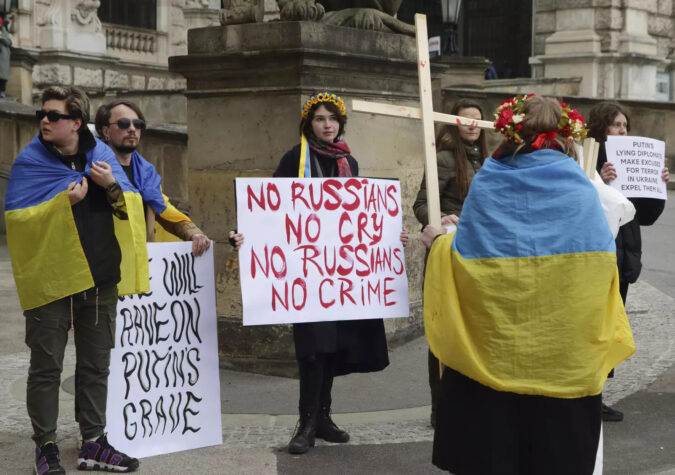VIENNA: A meeting of the Organization for Security and Cooperation in Europe’s parliamentary assembly got underway Thursday without the Ukrainian delegation, which described the planned presence of Russian lawmakers as “an affront”.
The two-day meeting of the normally low-profile assembly, which coincides with the anniversary of Russia‘s invasion of Ukraine, has been overshadowed by controversy over the Russians’ attendance. Austria granted them visas even though they are under European Union sanctions and despite protests from 20 countries including Britain, France and Canada.
The Austrians said that, as host nation, they were obliged to grant visas to representatives from all OSCE member states. Ukraine said it wouldn’t attend if Russia was present, as did Lithuania.
The Vienna-based OSCE, whose 57 member states include both Ukraine and Russia, was created during the Cold War as a platform for dialogue between East and West.
The group has a wide-ranging mission, including peace, human rights, arms control and other security issues. Austria’s parliament speaker, Wolfgang Sobotka, said that it is “our duty not to slam the door on diplomacy” and that “the OSCE, with its inclusive approach and comprehensive security concept, can and above all should be part of a solution to this conflict.”
“I do sympathize with the fact that some members find it unbearable to sit in the same room as the aggressors,” the parliamentary assembly’s president, Margareta Cederfelt, told the opening session. “But for those present today, this is your opportunity to stand up for Ukraine and to confront the lies from the aggressors.”
A Slovak delegate read out a statement from the Ukrainian delegation, which said that “the presence of these warmongers in Vienna is an affront to everything that the OSCE stands for.”
“They are not here for genuine dialogue nor for cooperation,” it added. “They are here to spread their propaganda … they are here to try and justify the war crimes they have committed and desecrate the principles of international law and human decency.”
The two-day meeting of the normally low-profile assembly, which coincides with the anniversary of Russia‘s invasion of Ukraine, has been overshadowed by controversy over the Russians’ attendance. Austria granted them visas even though they are under European Union sanctions and despite protests from 20 countries including Britain, France and Canada.
The Austrians said that, as host nation, they were obliged to grant visas to representatives from all OSCE member states. Ukraine said it wouldn’t attend if Russia was present, as did Lithuania.
The Vienna-based OSCE, whose 57 member states include both Ukraine and Russia, was created during the Cold War as a platform for dialogue between East and West.
The group has a wide-ranging mission, including peace, human rights, arms control and other security issues. Austria’s parliament speaker, Wolfgang Sobotka, said that it is “our duty not to slam the door on diplomacy” and that “the OSCE, with its inclusive approach and comprehensive security concept, can and above all should be part of a solution to this conflict.”
“I do sympathize with the fact that some members find it unbearable to sit in the same room as the aggressors,” the parliamentary assembly’s president, Margareta Cederfelt, told the opening session. “But for those present today, this is your opportunity to stand up for Ukraine and to confront the lies from the aggressors.”
A Slovak delegate read out a statement from the Ukrainian delegation, which said that “the presence of these warmongers in Vienna is an affront to everything that the OSCE stands for.”
“They are not here for genuine dialogue nor for cooperation,” it added. “They are here to spread their propaganda … they are here to try and justify the war crimes they have committed and desecrate the principles of international law and human decency.”
